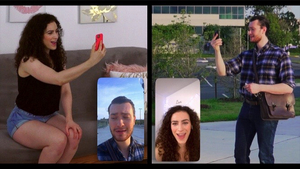Review: PAREA SERIES: THE TELEPHONE at Home Computer Screens
Updated Version of Menotti's Opera Shows Changes Over 70 Years
 On October 3, I watched an updated version of Gian Carlo Menotti's 1947 short opera, The Telephone. The dial telephone tethered to one room of the home that some of us oldsters grew up with has become a portable smart phone and each person has one. Even the time it took to dial a number had to be recalibrated because making connections is so much faster now. Ben and Lucy are still recognizable young lovers, however, and her addiction to the phone is more common than ever.
On October 3, I watched an updated version of Gian Carlo Menotti's 1947 short opera, The Telephone. The dial telephone tethered to one room of the home that some of us oldsters grew up with has become a portable smart phone and each person has one. Even the time it took to dial a number had to be recalibrated because making connections is so much faster now. Ben and Lucy are still recognizable young lovers, however, and her addiction to the phone is more common than ever.
The Parea Virtual Recital Series, which explains the opera to English speakers around the world, begins with seven minutes of introduction and finishes with twenty minutes of interesting discussion. The conversation involves Emily Misch, a young artist with the Glimmerglass Festival, Will Meinert, an apprentice singer with Santa Fe Opera, pianist Anna Betka, and stage director Audrey Chait, along with company artistic director Trevor Neal and composer Bruce Adolphe.
The opera set consists of a couch, pillows, and a coffee table. Lucy wears a t-shirt and jeans shorts while Ben is dressed for his train trip in a flannel shirt and black pants. Obviously, this is not an expensive opera to stage unless the company has special phones made. During the overture, Lucy performs actions common to those of us in quarantine for COVID-I9. She shows her "haul" from shopping, exercises on the couch, starts to cook, and plays with an exquisitely disinterested cat. Ben is restless because he has to catch a train but he wants to propose marriage to Lucy first.
Most of their music is in the middle of their ranges and for the first few minutes singers and piano seemed to eschew anything softer than mezzoforte. When he tries to get her to sit quietly and listen, she calls Siri and then Alexa for the time, after which her phone nearly vibrates off the couch.
I would love to have heard some deep resonant tones from Meinert, but the part does not lie very low. Writing in the 20th century, Menotti gives Misch rather complicated fioriture which she sings with vivid dramatic coloratura colors. Later on, the artists take a more lyrical approach to Menotti's score and perform their music with honeyed tones. It is fun watching Ben try to sever the charging cord when Lucy dives into the bedroom for a handkerchief. His moment is cut short, however, by her quick return. I think many a young man can commiserate with Ben when he lights candles and pours wine to no avail.
After Ben dons his mask and leaves for the train, Lucy begins to realize what he wanted to ask her and that she is playing with fire. When they eventually talk on the phone, she listens and they sing a charming duet that provides this opera with a delightfully happy ending.
The Parea presentation then ends with a discussion of the 2020 staging by singers Misch and Meinert, accompanist Betka, and stage director Chait, along with company artistic director Neal and composer Adolphe. Having seen the original Broadway presentation as a child, and having heard the opera a few times since, this online show was fascinating. It is available until the end of November for a suggested price of $25 and I think it is a fine introduction to opera.
Photos courtesy of Will Meinert.
Comments
.png)
|
.png)
|
Videos

